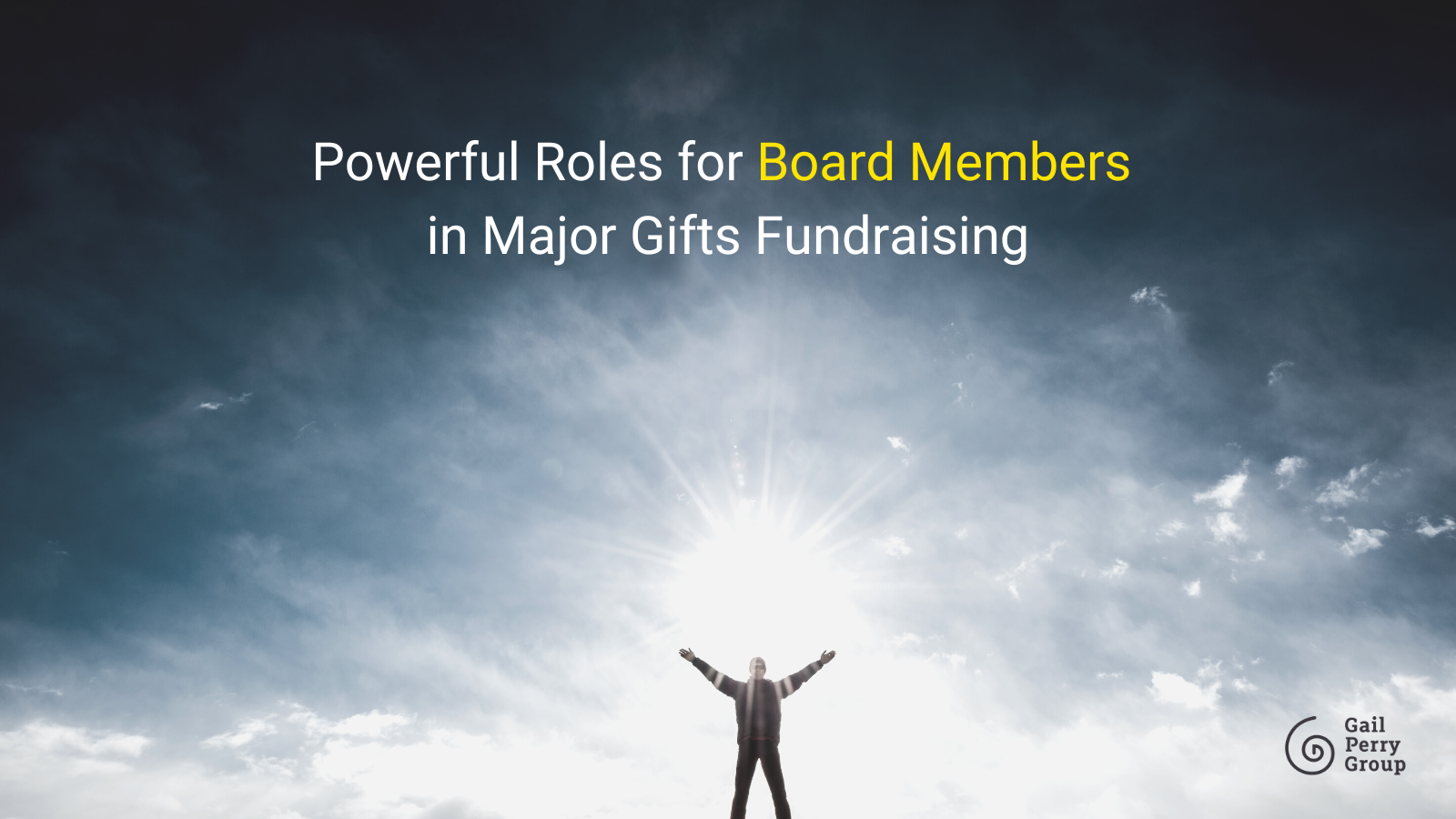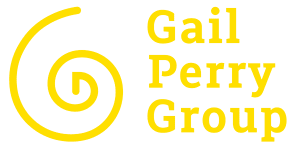Powerful Roles for Board Members in Donor Cultivation Cycle
 What are the right roles for board members in major gifts fundraising? We find that many board members are quite nervous about being involved with major gift fundraising – especially the ask. Since many board members have little experience in this arena, they may naturally think that “asking” is awkward, and even something to avoid. But we take a slower, more sophisticated approach to closing major gifts. The fact is, most large gifts are the result of many conversations with the donor over a period of time.
What are the right roles for board members in major gifts fundraising? We find that many board members are quite nervous about being involved with major gift fundraising – especially the ask. Since many board members have little experience in this arena, they may naturally think that “asking” is awkward, and even something to avoid. But we take a slower, more sophisticated approach to closing major gifts. The fact is, most large gifts are the result of many conversations with the donor over a period of time.
Board Members Need To Understand That the Process Takes Time
Often there is not a formal ask. Instead, the gift evolves over discussions about the donor’s interests and the impact the donor wants to make.
Certainly, there is a moment when we put an opportunity in front of a donor. But it is rarely a scripted, formal ask.
We always take it slowly, politely, because it’s important to move at the donor’s pace. Patience is a virtue! We never, ever make a donor feel rushed.
Our Work is Not Focused on Asking
Even more – and many board members don’t quite understand this – when dealing with major donors, asking for money is not our focus. Instead, we take the time to engage with the donor, listen to their vision, understand their priorities, and gently build up to a Gift Conversation.
Smart fundraisers work toward the long term, not the short term – developing important human-to-human relationships – not transactional ones that involve buying and selling.
We know that if we develop a happy relationship with the major donor, then the gift often takes care of itself.
We Are Focused on the Donor Relationship Itself
We know that developing a trusting relationship takes time. As I learned in my early fundraising days at Duke, the more times you connect with your donor before their gift, then the bigger their gift.
Asking for permission is key. We don’t ask till we think the donor is ready. And, we always ask for permission each step of the way. “Is this a good time to discuss . . . “
The first step in involving board members in high-dollar fundraising is to help them understand this whole, somewhat slow process of cultivating a mega gift. And – it’s hugely important for them to understand that they don’t have to be involved in the ask in order to be effective.
Many powerful roles for board members in major gifts.
So what are the best roles for board members in major gifts – especially with our patient, polite major donor approach that I’ve just outlined? There are actually many places in this long process of cultivating major gifts where board members can be extremely helpful – without having to be involved in asking or soliciting.
1. Board members can help identify potential major donors.
The smartest board members are always keeping their eye out for potential major donors to their favorite organization. For example, they’re always alert for people who might have the financial capacity and a strong interest in our work. In addition, board members can be very helpful reviewing lists of prospective donors. They can host screening sessions with other board members or small groups of donors to identify prospects. Board members can often serve as terrific detectives for us – who might be selling a business in town, who is interested in our type of work?
They’re constantly looking for our True Believers – donors who are passionate about our mission, and who might want to get more involved.
2. Graciously host and attend VIP cultivation events.
Another way board members can help open doors to new donors is by hosting no-ask socials such as porch parties. These small social events can take many forms: porch parties, picnics, fireside chats, meet and greets, lunches, dinners, all types of small gatherings. Hosting an event is one of the most powerful roles for board members in major gifts fundraising. For example, they can host and invite their network of contacts. Board members can use the small social format to introduce their friends and colleagues to the organization’s mission. There is a lot of power in pulling donors and prospect together for these types of VIP cultivation events. In the capital campaigns we’ve coached, small events are a terrific tool for gently opening the door and engaging with potential donors. In addition, board members can do many essential jobs to help a small event be successful:
- Attend and bring a few interested friends.
- Pick up older guests who don’t drive at night.
- Provide names for the invitation list and help get out invitations.
- Help underwrite the cost of food and drinks.
Finally, one of the most important things board members can do at small events is to graciously play “host.” They can engage with the guests, and help the staff “work the room.” When chatting with attendees, we like for board members to share the story of why they personally are involved. Then they can ask guests to share their own stories. When they listen to donors, they can be alert to indications of strong interest.
3. Listen to major donors and help them feel heard by the organization.
Listening is a lost art. It’s also one of the chief tools of major gift fundraisers. Our job is not to pitch a donor or “sell” her. Instead, it’s a delicate art of asking questions, bringing out our donor’s personal stories of why they care. One of the important roles for board members in major gifts is to simply chat with donors. They can encourage our donors to share their point of view, their hopes and dreams, and their philanthropic vision.
Modern major gift fundraising is completely, totally donor-centered.
We gently let the donor lead the way while guiding them with questions, suggestions, and opportunities to consider.
4. Ask only when you are “cleared” to ask.
In capital campaign and major gift fundraising. we plan our asks with extreme care. Often as a small team, we’ll thoughtfully decide when, where, who should go, who should be asked, how much to ask for, and for what project. As part of our planning, we may script out a gift conversation. An important step will be to warm up the donor by asking if they are ready for this type of discussion. Board members are often interested to find out how much preparation and deliberation undergirds major or capital campaign asks.
No volunteer or staffer ever makes an ask unless they are “cleared.” The strategy team will decide that it’s the right time and that the board member is the right person to ask.
Board members who don’t understand the delicate asking process can shoot themselves in the foot by moving to an ask too quickly. And the donor takes it as an affront. Then we have a tough situation. Being too forceful with donors about a gift can backfire, and even ruin the overall relationship with a donor.
5. Express personal appreciation and help donors understand the impact of their gifts.
It’s all about the thanking process. As my friends at Duke used to say:
The first gift is, hopefully, never the largest!
In fact, the first gift from a potential major donor needs to be an occasion of joy and celebration on the part of both the organization – and the donor. One of the important roles for board members in major gifts is to help thank and steward donors. They can help a donor feel deeply gratified by helping share the impact their gift is making. Board members can even help a donor feel true joy when the donor really gets to see the impact they have made. When board members, as the legal stewards of the organization, express their appreciation to donors, it means so much to donors. A board member thank you have more power than anything the staff can do.
Bottom Line: Roles for Board Members in Donor Cultivation Cycle
Clearly, there are many powerful roles for board members. We believe that everyone should choose their own role where they feel most comfortable. And staff leaders should put them to work in places where they can shine and be effective. Just remember, there are many ways board members can work with donors and help impact the bottom line. And, best of all, they can help close gifts without even being part of the ask.
As always, it is a pleasure to share our weekly insights with you as we cover important fundraising strategies. If your organization is planning a capital campaign or expanding your major gifts program – we can help. Send an email to coaching@gailperry.com if you’d like to schedule a free strategy call with us.



